- Home
- Kay Hooper
Velvet Lightning Page 2
Velvet Lightning Read online
Page 2
“You found the grave?”
“Thanks to Victoria, yes.”
“But ... no gold?”
“That,” Falcon said ironically, “would have been too easy, wouldn’t it? No gold. The chests were there, but empty. And as far as I could tell, the grave hadn’t been disturbed in years.”
“Fontaine must have gone back—”
“No, Victoria’s certain he didn't, and I agree with her. Fontaine didn’t need the money, and once he buried the chests he never went back.”
Leon was frowning even more heavily now. “Then one of the others.”
“Of that list of men only three survived the war. Morgan Fontaine was killed—tortured to death—by the other two. Obviously, they didn’t know where the gold was hidden. Both were later killed before the grave was found.”
Leaning back in his chair, Leon lighted a cigar and brooded for a moment. “Tyrone,” he said at last.
“It’s the only trail left. About two years after the gold was stolen, Tyrone anchored his ship in Charleston Harbor and went inland. I don’t know how far inland, but I believe he had time to go to Texas. Did he get the gold? I have no idea.”
“Where is he now?”
“The Raven left New York a few days ago and headed south.”
“Destination?”
“I haven’t been able to find that out.” Falcon decided not to mention Jesse; Leon was single-minded when it came to getting answers and was unlikely to appreciate the niceties of behavior that had kept Falcon from questioning his new brother-in-law.
“You’ll have to find him.”
“Yes.” Falcon studied the older man, then said slowly, “I had a look inside Tyrone’s office at the waterfront a few days ago.”
“Don’t,” Leon said, “tell me how you got in.”
“Right.” Falcon grinned, then sobered. “Anyway, I found a ledger dated 1863. On a page headed by the month of April, there was a word, heavily underlined, and a list of names.”
“What word?”
“Camelot.”
Leon went very still, his eyes narrowing. After a moment he said slowly, “That’s interesting.”
“Your name was on the list, Leon.” Falcon had been following no more than a hunch, but now he felt an odd leap of his senses as he took in the older man’s blank expression and the guarded look in his eyes.
Leon smoked in silence, then shook his head. “You’re on the wrong track, Falcon. That can have nothing to do with the stolen gold shipment. Nothing at all.”
“I think it does.”
“No. You’re wrong.”
“Was Camelot a code name?”
Leon ignored the question. In a slow, careful tone, he said, “Something happened, something Tyrone took part in. But it was before the gold was stolen, and there’s no connection.”
Aware that Leon would dig in his heels and refuse to say a word if he was pushed too far, Falcon probed cautiously. “Why did Tyrone write down the names of those involved?”
“He shouldn’t have done that. It was reckless of him.”
Falcon, who thought privately that Marc Tyrone was one of the least reckless men on earth, saw a different answer. “Was it? Or was it, perhaps, Tyrone’s way of safeguarding himself—because something went wrong?”
Leon’s mouth tightened. “You’re guessing.”
“I have the other names, Leon.”
“You won’t question them.” Perhaps realizing that Falcon had stiffened, Leon went on more calmly. “Look, Falcon, you’ll have to trust me. Camelot is not connected to the gold. It was, however, a ... a sensitive issue at the time, and still is. If you go poking around and asking questions, you’re going to disturb the men involved for no reason. No reason. It’s a closed book, and I mean it to stay that way.”
“I don’t like this, Leon.”
“No, I don’t expect you do. But facts are facts. There’s no sense stirring up a hornet’s nest when it would bring you no closer to finding the gold.”
After a moment Falcon relaxed and smiled. “Well, it wouldn’t be the first time I've been wrong.”
Leon felt uneasy, and tried to read those enigmatic green eyes. For the first time, he questioned his own wisdom in setting a determined Delaney on the trail of lost gold. “You won’t question the others?” he asked a bit sharply.
Falcon absently adjusted the leg of his trousers, his eyes veiled. “As you said. There’s no sense in stirring up a hornet’s nest.”
“Good. Good.” He hesitated. Still uneasy, he tried to project casualness into his voice. “I suppose you’ll be trying to track down Tyrone now?”
“He’s the only one left.”
Leon nodded slowly. “Yes. Still, I can’t see what use he would have had for the gold. He was a wealthy man even then.”
“I know. Interesting, isn’t it? The only man who couldn’t possibly have needed the gold was likely the man who got it.” He was watching Leon intently, saw unease and worry.
Abruptly, Leon said, “If I took you off the case, you wouldn’t stop, would you?”
“No,” Falcon said quietly. “I wouldn’t stop.”
Leon said nothing more.
Much later that night Victoria sat brushing her hair while she watched her husband pace. “It’s really bothering you,” she said softly.
Falcon sighed. “It wouldn’t be if Leon had been less bothered himself. He’s so sure this Camelot has nothing to do with the gold, but whatever it is, he’s worried to death about it. I think he was shocked to find out that Tyrone had kept a list of names, had written down that code word. It’s almost as if .. .”
“What?” she prompted after several seconds of silence.
“As if Leon were afraid. I’ve never seen him like that. As if this Camelot had the power to destroy his life.”
“What if it does?”
Falcon paced a moment longer, then came to the bed and sat beside her. “I have to talk to Jesse,” he said reluctantly. “I have to find Tyrone. If there is a connection to the gold, then he’s it.”
“Which are you after?” she asked him. “The gold? Or Camelot?”
“Both now. Victoria, I’ve always trusted my instincts. And my instincts are telling me that if I find out what this Camelot is, I’ll know what happened to the gold.”
After a moment she nodded. “Then you’ll have to talk to Jesse. He’s the only one who knows where Captain Tyrone is.”
“I don’t want to do it,” Falcon said.
She smiled. “I know. But you don't have a choice.”
“I hope Jesse sees it that way,” Falcon said dryly.
2
Port Elizabeth
Flicking the thong of his whip lightly over his horse’s gleaming chestnut rump, Marcus Tyrone was conscious of an unusual impatience within himself. The horse trotted more quickly, hooves rapping sharply against the hard-packed dirt of the drive. Behind the buggy, a large and imposing house loomed among tall trees draped in Spanish moss; it was almost lost in the shadows, left insubstantial, as the horse, buggy, and man moved away from it.
The horse turned automatically north toward town as it left the drive, and Tyrone shook the reins lightly to encourage a faster pace. The buggy was well-sprung and comfortable, but he hardly noticed. He glanced to the west sometime later as they topped a rise, seeing his ship, The Raven, at anchor in the snug little harbor. She was a neat, fast little ship, and had, during the war, made him his fortune. She had been his first ship, bought more than ten years before with a loan from Morgan Fontaine.
The loan had been repaid in full exactly one year later.
Following the road as it curved eastward, the buggy moved on, and Tyrone lost sight of the harbor. The only town on the island had been built some distance from the harbor at the northern end of the island, an inconvenience the merchants despised; they tolerated it because the settlers on Port Elizabeth had made it clear they remembered only too well the congested port cities of England and would not repeat their forebears’ mistake
s.
They were an odd sort of people to have settled here, Tyrone thought idly. Though far closer to American shores than to their own England, they considered themselves British subjects and had been known to fight about it when challenged. Tyrone, who didn’t much care whether English or American law ruled, kept his amusement to himself and got on with the islanders quite well. Regarded with suspicion when he had built his house nearly eight years before, he was now accepted. Even if they still referred to him as “that American, Captain Tyrone.”
They were, for the most part, wealthy people who had chosen to settle here, which was just as well. Port Elizabeth, named grandly for England’s Virgin Queen, hadn’t much to recommend it as a thriving center of agriculture or industry. The fishing was fair, but the soil refused to support crops, and all foodstuffs had to be imported. There was a severely limited supply of fresh water originating with a small wellspring, and any idea of mining was a dream. Lacking good soil, fresh water, and valuable mineral deposits, the settlers of Port Elizabeth had opted for civilization. And they were very good at it.
Tyrone, called a rogue by his own people, found the settlers of the island amusing in their careful surface courtesy and extreme refinement of manner. Amusing enough, at any rate, to be willing to be polite and civilized himself.
In general, he spent at least a week out of every month in Port Elizabeth, returning between visits to his shipping business based in New York City. He planned to remain considerably longer this time. He had arrived late the night before and had gone directly to his house without stopping in town. The middle-aged couple who kept house for him had greeted him without surprise, having grown accustomed to his comings and goings.
He suspected he was an enigma to them; if so, they never mentioned it. To them, as to the settlers of the island, Marc Tyrone was a wealthy businessman who kept a second home there, and who could be counted on not to disgrace himself with drunkenness or with compromising unmarried daughters. (A daughter or two had been heard to complain about that, but only amongst themselves.)
He was a tall, loose-limbed man with powerful shoulders and a way of moving that was like a big, lazy cat. He had black hair lightly silvered at the temples, a handsome face, and rather cold and impersonal gray eyes. His smile, which he rarely offered, was surprisingly charming.
A few female heads turned as his buggy swept briskly down the main and only street of the little town, and polite nods of welcome were sent his way. Tyrone returned the gestures with exact courtesy, giving only what he received and neither asking nor offering more. He stopped the buggy before the mercantile and got out, moving forward to tether his horse.
He felt again the unaccustomed flash of impatience, a touch of eagerness that was alien to him. He was, for the most part, a patient man, given to observing, to reflecting cynically, and this unusual mood surprised him. He was, he decided finally, merely tense and restless from having worked hard since his last visit. It would do him good to relax.
That settled to his satisfaction, he stepped up onto the wooden sidewalk, and promptly cannoned into a tall lady burdened with packages who was leaving the store briskly. The packages, of course, scattered wildly, and Tyrone quickly grasped her upper arms to keep them both on their feet. He could feel her stiffen instantly, and wasn’t surprised when she stepped back the moment balance was regained.
“Pardon me, Miss Waltrip,’’ he said politely, and bent to gather the packages at her feet. At her feet . . . the thought was secretly amusing to him.
She waited in silent disdain, a tall, slender woman not yet irrevocably “on the shelf” at twenty-eight, but fast approaching the status of spinster. It didn’t appear to trouble her. Nothing, in fact, appeared to trouble Miss Catherine Waltrip. The unattached men of Port Elizabeth tended to eye her warily; the women treated her with the same frigid politeness she offered them; and her charming rogue of a father often seemed her child rather than her parent when he quailed visibly before her ironic gaze.
She had dark hair worn always in a braided coronet, the milky pale complexion of old porcelain, and frosty blue eyes. Her voice was calm, her posture straight, her gaze direct and impersonal. A genuine smile might have made her beautiful, but even her meaningless public smile was rare and brief.
She wasn’t smiling now.
Tyrone got to his feet, holding her packages and inclining his head politely. “May I carry them for you, Miss Waltrip?”
“No, thank you. Sir.”
The “sir,” he thought, had definitely been tacked on as a pointed afterthought. He bore the subtle insult like a gentleman. “My pleasure,” he insisted.
With an economy of movement she reclaimed her packages, never once touching him with her neatly gloved hands. She nodded briefly in spurious courtesy and walked past him.
Tyrone turned to watch her, absently admiring the straightness of her carriage, her brisk, almost mannish stride. She went a short distance down the street and stowed her packages in the back of a buggy like his own, then climbed in with grace and without help, showing no more that a fleeting glimpse of a neatly turned ankle. She picked up the reins and moved away down the street, looking straight ahead. She would, Tyrone knew, drive to the big weathered house just outside town, where she and her father had lived for slightly more than two years.
“That woman!”
Tyrone turned back toward the store, correctly guessing that the explosive comment had been intended to gain his attention. “Good morning, Mrs. Symington,” he said cordially, greeting the self-elected guardian of manners, morals, and gossip on Port Elizabeth.
She simpered a bit, a stout, middle-aged lady, tightly corsetted and sporting an impressive hat of French ancestry. “How nice to have you back among us, Captain Tyrone. Are you staying long this time?”
“I haven’t decided, ma’am,” he said, although it was a barefaced lie; caution was the watchword around this woman.
“I'm having a small dinner party tomorrow night. If you’re free, perhaps—?”
“Unfortunately,” he said, “I don’t believe I will be. But thank you.”
She eyed his noncommittal expression and was undaunted. “Well, come if you can.”
“Yes, ma’am.”
She glanced past him at the disappearing buggy and, her grievances recalled, said again, “That woman!”
Tyrone had been waiting for it. Mrs. Lettia Symington had a daughter of marriagable age, and had a habit of sweetly—and quite slanderously, he thought—discussing other young women with any unattached man. She also despised Catherine Waltrip because she had never succeeded in cutting her down to the proper size.
“Has Miss Waltrip upset you, ma’am?” he asked, wondering if anything unusual had happened in the month since his last visit to the island.
Mrs. Symington swelled perceptibly with righteous indignation. “She insulted me! She insulted my hat!”
Tyrone eyed the confection of lace, plumes, and what appeared to be at least three birds, and hid his laughter behind a grave expression. “Terribly rude of her,” he offered, biting the inside of his cheek to keep himself from asking what, exactly, Miss Waltrip had said about the hat.
“She’s a horrid woman,” Mrs. Symington said roundly, with none of her usual hinting. “It’s a disgrace, the way she treats that delightful father of hers. Why, I wouldn’t be a bit surprised if she’d done something just terrible back in England, and that was why she dragged him here. Poor man, he’s always longing to go back and visit, but, of course, she won’t hear of it!”
Tyrone, who thought privately that Lucas Waltrip complained a good deal too much about a great many things, had no comment to make.
And Mrs. Symington, her spleen partially vented, adjusted her hat, smiled brilliantly, and, with a maternal pat on his arm, invited him to “just drop in anytime,” before going on her way to spread more joy.
He reflected cynically that she’d be appalled if he did visit her opulent home unexpectedly because her daughter woul
dn’t have time to get herself up properly for the occasion. Tyrone went inside to ask the shopkeeper, Mr. Abernathy, to increase the regular weekly shipment of groceries to his house since he was back on the island. He also ordered a dozen shirts, disregarding the fact that his own ship had likely brought them in, and talked casually for a few moments; aside from Mrs. Symington, Mr. Abernathy was the best source of gossip in town.
“Has anything interesting happened lately?” Tyrone asked.
Mr. Abernathy, a heavily built man who would have looked more at home tending bar or shoeing horses, pursed his lips in thought as he stood negligently behind the long counter.
“We had the magistrate in last week,” he offered. “Mrs. Symington accused Miss Waltrip of drowning that little dog of hers in the stream. Said it was sheer spite and nothing more. Got properly tearful about it. Half the town turned up in court.”
“And believed Mrs. Symington, no doubt,” Tyrone murmured.
“Oh, well, as to that, there was no proof, you know. And a bit hard to picture Miss Waltrip tossing the little dog to its death. Wouldn’t want to dirty her hands, I’d guess.”
Tyrone looked at him for a moment, reflecting that the townspeople had most certainly believed Mrs. Symington. They always did. He changed the subject, talked casually for a few more minutes, then lazily took his leave. He unhitched his horse and climbed into the buggy. He drove back the way he’d come, passing the small bank, the equally small hotel, a restaurant, a barbershop, two dressmakers’ shops, and the livery stable.
Leaving the town behind, he drew the whip across the chestnut’s rump and they moved on briskly. He passed the Waltrip house without a glance. Just around the bend, with the house hidden by tall trees, he drew up and sat listening for a moment. No sound. He glanced around to make certain, then turned his horse off the main road and onto a rutted track that seemed to disappear into the cool depths of the island’s inland forest. Within moments the buggy was surrounded by shade and cool.
Sometime later a small cottage appeared suddenly, as if it had grown from the forest. It had a thatched roof, two windows in front, a solid wooden door, and looked to contain perhaps two rooms. Tyrone halted the horse and climbed out of the buggy. The chestnut, having been there before, rested a hind leg and swished his tail lazily, preparing to doze. Tyrone walked to the front door, absently noticing that bright blue curtains hung gaily in the window. They were new. He opened the door without knocking and went in.

 A Deadly Web
A Deadly Web Raven on the Wing
Raven on the Wing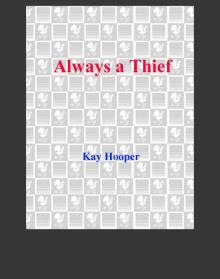 Always a Thief
Always a Thief Star-Crossed Lovers
Star-Crossed Lovers Blood Dreams
Blood Dreams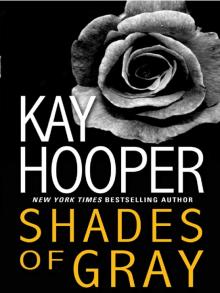 Shades of Gray
Shades of Gray Rebel Waltz
Rebel Waltz Chill of Fear
Chill of Fear Sleeping With Fear
Sleeping With Fear After Caroline
After Caroline Time After Time
Time After Time Haunting Rachel
Haunting Rachel Hunting Fear
Hunting Fear Out of the Shadows
Out of the Shadows Whisper of Evil
Whisper of Evil Blood Sins
Blood Sins Hiding in the Shadows
Hiding in the Shadows C.J.'s Fate C.J.'s Fate C.J.'s Fate
C.J.'s Fate C.J.'s Fate C.J.'s Fate Fear the Dark
Fear the Dark Illegal Possession
Illegal Possession Stealing Shadows
Stealing Shadows If There Be Dragons
If There Be Dragons Once a Thief
Once a Thief In Serena's Web
In Serena's Web On Wings of Magic on Wings of Magic
On Wings of Magic on Wings of Magic Hostage
Hostage The First Prophet
The First Prophet Through the Looking Glass
Through the Looking Glass Golden Flames
Golden Flames Finding Laura
Finding Laura Haven
Haven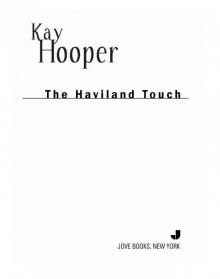 The Haviland Touch
The Haviland Touch The Lady and the Lion
The Lady and the Lion Haunted
Haunted Velvet Ligntning
Velvet Ligntning Blood Ties
Blood Ties Adelaide, the Enchantress
Adelaide, the Enchantress The Matchmaker
The Matchmaker Golden Threads
Golden Threads The Haunting of Josie
The Haunting of Josie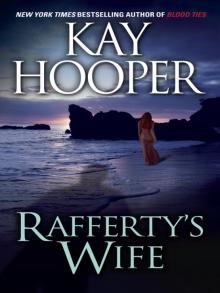 Rafferty's Wife
Rafferty's Wife Amanda
Amanda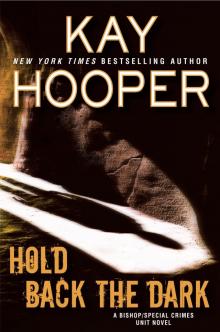 Hold Back the Dark
Hold Back the Dark Sense of Evil
Sense of Evil What Dreams May Come
What Dreams May Come Larger Than Life
Larger Than Life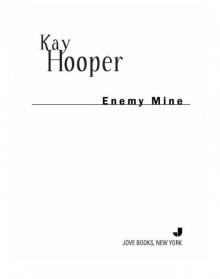 Enemy Mine
Enemy Mine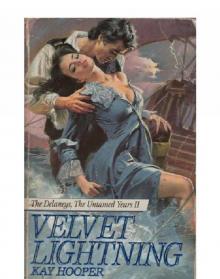 Velvet Lightning
Velvet Lightning The Fall of Lucas Kendrick
The Fall of Lucas Kendrick Aces High
Aces High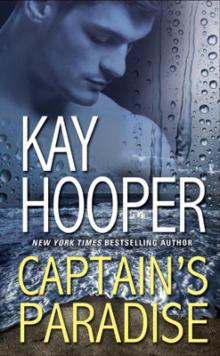 Captain's Paradise: A Novel
Captain's Paradise: A Novel The Wizard of Seattle
The Wizard of Seattle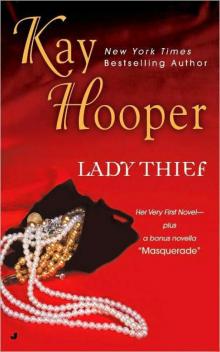 Lady Thief
Lady Thief Summer of the Unicorn
Summer of the Unicorn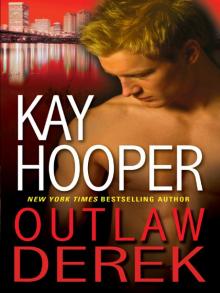 Outlaw Derek
Outlaw Derek Wait for Dark
Wait for Dark The Glass Shoe
The Glass Shoe It Takes a Thief
It Takes a Thief Zach's Law
Zach's Law Unmasking Kelsey
Unmasking Kelsey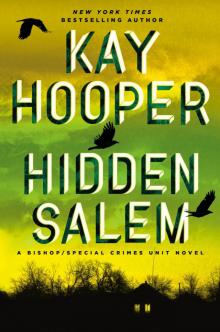 Hidden Salem
Hidden Salem